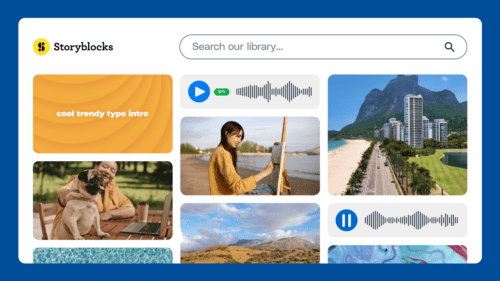Growing demand for content related to mental health awareness first came onto our radar in early 2019. If you look at what’s been happening in American media, the demand makes sense. Public conversation about mental health awareness experienced some positive strides this past year and it doesn’t seem like that will change as we move into 2020. A strong movement to de-stigmatize mental illnesses and treatment is underway and playing out on the public stage.
Erasing the Stigma
Mental health topics have experienced a huge jump of 40% growth in search volume overall. On Storyblocks Video, searches for “meditation” are up 93%, “addiction” are up 75%, “help” are up 66%, “depression” are up 30% and “recovery” are up 20%—and that doesn’t even cover the more specific searches related to these topics.
Prominent pop culture icons, politicians and media figures have been opening up about their personal relationships with mental health, inspiring the general public (particularly younger generations) to do the same. Recently, SoulPancake and Funny or Die partnered to produce “Laughing Matters” a documentary-short detailing the struggle with mental health many comedians experience. The doc features high-profile comedians and actors like Rainn Wilson, Sarah Silvermana and Wayne Brady, to name a few. Many of these popular figures have, until now, mostly kept their struggles out of the public eye.
With topics like addiction and recovery, the national opioid crisis remains in the national spotlight, being covered in documentaries, news, and even political campaigns. It played a large role in the 2016 U.S. presidential election discourse and will undoubtedly be a part of the 2020 elections as policies and remedies continue to be discussed. The current democratic candidates have all shared their positions and proposals to date.
The Relationship with Social Media
Although mental health awareness is being covered in a variety of media platforms from news to podcasts to advertising, we predict that social media will play a major role in elevating the conversation in 2020. Social campaigns like #worldmentalhealthday have dominated Twitter, Instagram, and more with posts about awareness, personal stories, and more.
Being that mental health is such a personal experience, it’s not surprising to see that social platforms are where the trend is rising. Within the creator community, there is a growing movement to acknowledge the burnout and mental stress that influencers like YouTube stars experience. It was an alarmingly dominant topic at this year’s annual VidCon convention.
Stock Media’s Role
As mental health awareness becomes a bigger topical focus and is featured widely in the media, we need to talk about the importance of authenticity in mental health imagery. The subject is particularly difficult to represent visually.
For example, mental health conditions and illnesses are complex and there isn’t a singular face or expression that represents each one. However, we should strive to shift away from representing “depression” with an over-exaggerated frown, or “recovery” with yoga on the beach. The stock media industry has a role to play here, and all content creators have an opportunity to help shape public discourse through the visual representations used. The more effort that’s put into learning about the nuances of mental health and utilizing authentic imagery, the more we can de-stigmatize mental illnesses and help further the conversation.
The Future of Mental Health Conversations
We hope that mental health awareness isn’t a passing “trend,” but the start of a movement to normalize open discussion about mental health and end the stigma. It will be one of the most important topics to follow in 2020 and one we’d like to see continually grow.
See all the creative trends for the coming year in our 2020 Trends Guide



![[Re]introducing: The Storyblocks Plugin for Adobe Creative Cloud](https://www.storyblocks.com/resources/wp-content/uploads/2023/03/Screen-Shot-2023-03-07-at-10.22.48-AM-e1678203001433-500x382.png)